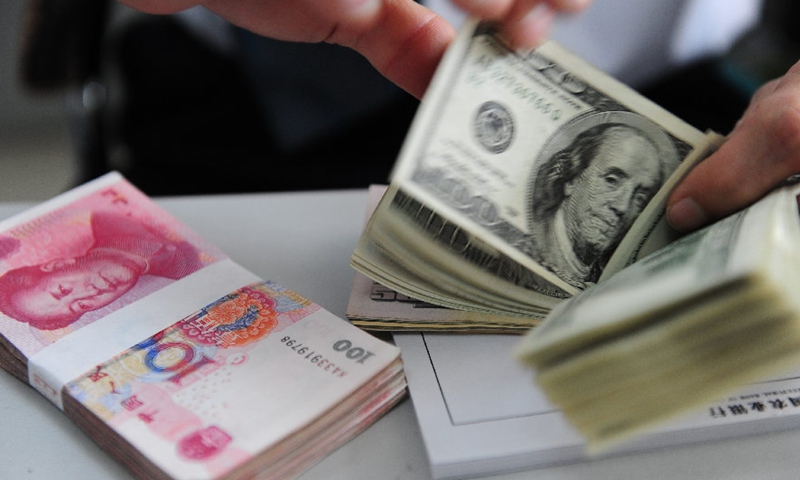Expert: The role of the U.S. dollar declines
The US Government is BROKE | The 2023 Debt Ceiling
Every few years, there is a bipartisan political farce over the debt ceiling negotiations in the US. It may look like a routine political drama, but quantitative change can lead to a qualitative difference, especially at a time when a global de-dollarization trend is gaining momentum, that is to say, the US trick of raising the debt limit to mitigate its default risk may now be very close to pushing the US treasuries to a dangerous tipping point.
The de-dollarization caused by the US debt crisis and the abuse of the dollar hegemony created unprecedented opportunities for the yuan internationalization, with more and more countries expressing willingness to settle trade in the yuan, but China must proceed with caution.
With the US on track to default without a debt ceiling increase, US President Joe Biden's talks with House of Representatives Speaker Kevin McCarthy on Tuesday failed to make any meaningful progress, with political divides remaining between the two parties, Reuters reported. Biden even told the media that he has been looking at the 14th Amendment as a way to unilaterally work around the debt ceiling, though it will not be a viable short-term solution.
The political stalemate over raising the debt limit has already led to US Treasury Secretary Janet Yellen warning of an "economic catastrophe" if the US fails to meet all government payment obligations, which could happen "potentially as early as June 1."
So far, most people still believe that the two parties will eventually reach a deal to avoid an ugly sovereign default before the deadline, just like what happened every time in the past debt ceiling struggles.
But unlike in the past, a new question has been raised in the market, that is, are the US treasuries still highly liquid? The US dollar's credit is the cornerstone of US treasuries. Because the dollar is an international settlement currency and US treasuries have stable yields and are highly liquid, countries are willing to hold US debt, making the US the world's largest debtor.
Yet, things may be different now with countries accelerating their de-dollarization efforts. The past year saw growing number of countries and regions such as India, Brazil, and the EU trying to establish new settlement systems for their trade.
Under the influence of the de-dollarization wave, some countries have reduced their holdings of US treasuries. Japan, the world's largest holder of US debts, slashed its holdings by $224.5 billion and China by $173.2 billion in 2022.
Moreover, the US' unlimited expansion of the size of its debt has also upset the market with the risks in the US treasuries. According to Yellen's testimony in a congressional hearing in March, gross federal debt would swell to $51 trillion after a decade. The scale and speed of the debt expansion means the US is getting increasingly closer to a real explosion of a debt crisis.
Also, the root cause of the US banking crisis this year is the holding of a large number of US treasuries assets, which shrank significantly in value as interest rates continued to climb. That could be a warning to various governments and precipitated them to speed up the pace of de-dollarization. Since the collapse of the Silicon Valley Bank, international investors stepped up sell-off of treasuries, and prices of all kinds of safe-haven assets like gold have surged.
Of course, de-dollarization is likely to be a long-term process, but once it started, the US treasuries could lose its aura quickly, especially as the US government repeatedly raises debt ceiling or faces risk of default. In other words, as the world realizes that the US cannot and does not have the willingness to control or reduce the size of its debt, the credibility of the US debt as a safe-haven asset is collapsing rapidly.
It should be noted that amid the de-dollarization trend, the yuan internationalization has made a series of positive new developments and breakthroughs. The yuan's international status as a trading currency has been significantly improved recently.
To ensure future development of the yuan internationalization, China needs to ensure liquidity and maintain exchange rate stability. Thus, China's financial markets as well as the yuan's onshore and offshore markets need more preparation to adapt to the new needs.
China reduced its holdings of US Treasury bonds for the sixth straight month in January 2023, which analysts ..
Banking is stable? It's an illusion
https://www.thestar.com.my/business/business-news/2023/05/11/banking-is-stable-its-an-illusion
Druckenmiller sees US recession, hard landing
https://www.thestar.com.my/business/business-news/2023/05/11/druckenmiller-sees-us-recession-hard-landingRelated posts:
'Dedollarisation' is feasible
Abuse of hegemony is why de-dollarisation is trending
China, Brazil to trade in local currencies
World witness peace, development, cooperation, yuan settlement, as Brazil's President Lula starts China tour, shrugs off noise from the West, ties see deeper and wider potential for growth
Any contagion from US banking crisis?
The strong dollar should not become a sharp blade to cut the world, THE NEED FOR BRETTON WOODS III
Whither the ringgit? US Inflation & workforce are the bigger problems
In desperation, US tries to drag EU into its camp













